Carrots and Sticks: Saving the Amazon and Stalling Climate Change
Air Date: Week of December 4, 2009
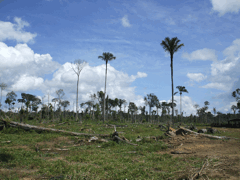
(Photo: Bobby Bascomb)
In an attempt to stall Amazon deforestation, the Brazilian government is stepping up law enforcement and ranchers are experimenting with a new method to profit from their forest. Living on Earth’s Bruce Gellerman and Bobby Bascomb travel with federal agents who are outgunned and outnumbered on a raid of an illegal ranch. They also meet a carbon cowboy who wants to harness greed to stop deforestation.
Transcript
CURWOOD: It’s Living on Earth. I’m Steve Curwood. And our special report “REDD Path to A Green Planet” continues in Brazil’s Amazon.”
[JUNGLE AND ANIMAL SOUNDS]
CURWOOD: The peaceful sounds of the Amazon forest at dusk can be deceptive.
[JUNGLE SOUNDS CONTINUE]
CURWOOD: The Amazon is a dangerous place, especially for environmentalists, and especially in the remote northern state of Para. It’s here, that American nun Dorothy Stang lived and worked for 30 years, helping landless poor farmers, and fighting against illegal loggers and cattle ranchers.
STANG: We’re going to protect it so no loggers, or ranchers can ever make anything out of this area that would be detrimental to the biodiversity.
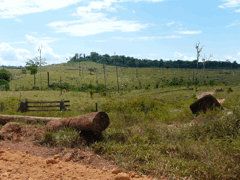
A clear line separates forest from farmland. (Photo: Bruce Gellerman)
CURWOOD: In 2005 Sister Dorothy Stang was murdered, shot point-blank 6 times by hired assassins. She’s one of the hundreds of environmentalists in Para who have been killed over the past few decades. The REDD mechanism – Reducing Emissions from Deforestation and Degradation – is designed to increase the value of the standing forest. If it is to have any hope of succeeding in the world’s largest tropical forest, it will have to work in a place where murder is a way of life in the struggle over the land. We rejoin Living on Earth’s Bruce Gellerman and Bobby Bascomb as they journey to one of the most dangerous parts of Para with an environmental SWAT team.
GELLERMAN: Officially, the region’s known as the “legal Amazon” but law enforcement never really followed the millions of settlers who were encouraged to move here in the 1970s. The military government promised land titles and law enforcement to poor migrants, but delivered neither.
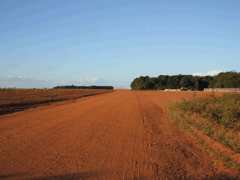
Most roads through the Amazon remain unpaved. (Photo: Bobby Bascomb)
BASCOMB: As we found out, this vast frontier is a lawless, often violent place. We met David Lourenco, a senior official in Brazil's Ministry of Strategic Affairs. He says, today Brazil is still trying to bring the Amazon under federal control.
LOURENCO: It's an unplanned dynamic resulting in chaos and conflict and violence and deforestation. The Amazon is by far the leader in deaths related to the struggle for land. It’s always a problem. The capacity to enforce rules, laws and policies in the Amazon is very low.
BASCOMB: We learned first hand that the long arm of the law doesn’t reach far into the Amazon.
[MAN SPEAKING PORTUGUESE]
BASCOMB: When we visited Brazil's environmental law enforcement agency we were told it has little money – only four helicopters and 400 armed agents to patrol an area the size of the continental United States.
EVARISTO: Es muy grande heh?
GELLERMAN: Luciano Evaristo points to a wall size map of the Amazon in his office. The Amazon is huge, yes, he says:
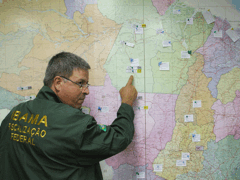
Luciano Evaristo stands in front of a wall-size map to point out areas where IBAMA, Brazil's federal environmental law enforcement agency, has conducted raids of illegal logging and ranching. (Photo: Bobby Bascomb)
EVARISTO: Post at cinco million quadras…
GELLERMAN: Evaristo is head of law enforcement at IBAMA, Brazil’s EPA. He flashes his badge and pulls out his gun, and proudly puts on his jungle combat jacket, which still has the tags on it.
[MAN SPEAKING PORTUGUESE]
GELLERMAN: On his map are 300 pushpins. Each one marks the places where IBAMA agents conducted raids last year. Most against heavily armed illegal loggers and ranchers.
EVARISTO: [Translation] A lot of times we get shot at, and we fire back. The problem is especially bad in the Amazon state of Para.
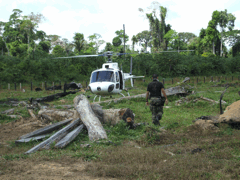
Federal IBAMA agents checking out an illegal cattle ranch. (Forest Bruce Gellerman)
GELLERMAN: Can we go to one of your busts?
EVARISTO: [Translation] Yes, you just need to choose which one. Do you have a bulletproof vest?
BASCOMB: Will you give us one?
EVARISTO: [Translation] [Laughs] Do you have life insurance? [Laughs]
GELLERMAN: Maybe I won’t go.
EVARISTO: [Translation] If we go you go.
GELLERMAN: They went…so we went.
[SLAMMING DOOR; MAN SAYING “VAMOS…ALRIGHT, LET’S GO]
GELLERMAN: We drove 500 miles on the Trans Amazon to the town of Novo Progresso – a backwater in Western Para. IBAMA has a brand new office here because residents of the town burned the last one to the ground along with the federal agents’ trucks. Logging and ranching are the lifeblood of the economy here. Environmental police aren’t welcome.
[HELICOPTER SOUNDS]
GELLERMAN: A helicopter arrives with senior IBAMA commanders. They’ve assembled a team of about a dozen federal agents from around Brazil. The agents will only stay here for about three months and keep to themselves so they don’t become targets for assassins.

The first IBAMA raid of illegal ranching was inside a national park. (Photo: Bobby Bascomb)
BASCOMB: A dozen more state and local police join this raid, they call it “Operation Minotaur,” named for the mythic Greek creature that has the head of a bull and the body of a man. The commandos carry pistols, automatic weapons, and pump action shotguns. Many wear bulletproof vests, but not us.
[HELICOPTER SOUNDS CONTINUE]
BASCOMB: The helicopter leads the way. Bruce, Marco our guide, and I follow in a truck convoy.
[ROAD AND TRUCK SOUNDS]
GELLERMAN: So, Bobby, what do you think?
BASCOMB: What do I think? I don’t know what to think. I don’t know quite what to expect from today. We thought it was just going to be a reconnaissance trip – as it turns out this is the actual bust. This is the real thing, so, ummm….
GELLERMAN: Are you scared?
BASCOMB: No, not really. I don’t know why I’m not. I should be. But I don’t feel scared for some reason. Are you? Are you scared?
GELLERMAN: No, but I don’t know what to expect.
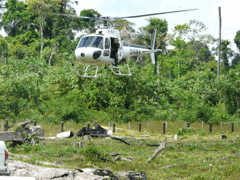
An IBAMA helicopter lands to raid an illegal cattle ranch inside a national park. (Photo: Bruce Gellerman)
BASCOMB: Yeah. That’s the worst part is the not knowing – not knowing what to expect, but maybe its better that way.
LIMA: Remember that this area is where the fire burns higher.
GELLERMAN: What do you mean?
LIMA: It’s the most dangerous area of Brazil right now – land grabbing, it’s right here. We are here in the middle of the fire.
BASCOMB: So should we be scared?
LIMA: Yeah, we have to be very careful.
GELLERMAN: Now I’m scared.
BASCOMB: Yeah, right.
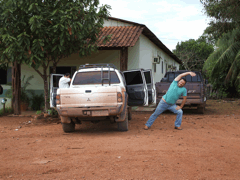
Guide and interpreter Marco Lima stretches to get ready for a long day of driving the unpaved Trans-Amazon highway. (Photo: Bobby Bascomb)
BASCOMB: We drive for hours along the Trans Amazon finally turning onto a path bulldozed through what's left of the jungle. Satellite photos confirm a tipster's report that there are nearly 45 thousand head of cattle being illegally raised here.
GELLERMAN: Remarkably, this is the middle of a national park. What remains of the rainforest is a haunting sight; charred skeletons of trees slashed and burned, their gnarled limbs reach skyward, leafless and lifeless.
GELLERMAN: Look at that – it’s really devastated, they really wacked the forest here.
LIMA: Yeah, we’re talking about at least in this area where we can see two to two and a half thousand acres of open cleared land. Probably, Bruce, this was a big fire – one big, solid fire.
[TRUCK SOUNDS ON ROAD]
LIMA: It looks like It’s been heavily bombed.
GELLERMAN: So Marco, we see motorcycles here. They know were coming don’t they?
LIMA: Well, yeah. In this area when they see IBAMA they say, ‘There come the man. There comes the guys.’ Because IBAMA here they know it’s big trouble for them. It’s really big trouble.
[TRUCK SLOWS; CAR DOORS OPEN]
BASCOMB: Finally, we arrive at a ranch but nobody's home. A pot of coffee on the stove is still warm. Seems the only thing missing is a welcome mat.
[WALKIE-TALKIE SOUNDS]
BASCOMB: The IBAMA agents search the place, but they come up empty handed.

A ranch house, complete with fences and a satellite dish illegally located inside a national park. (Photo: Bobby Bascomb)
GELLERMAN: Look at this guy, he’s got a ranch house, he’s got a satellite dish. He’s got beautiful fences. I mean he’s not trying to hide from you; he’s pretty darn obvious.
[MAN SPEAKING PORTUGUESE]
VOICEOVER: They think just because IBAMA doesn't have a fixed base they think we'll never go after them but we will.
[HELICOPTER SOUNDS; WALKIE TALKIE SOUNDS]
GELLERMAN: It was the same scene three hours later at another ranch in the national forest. Again: nobody home.
[VOICES TALKING; GRUNTING NOISE]
GELLERMAN: But this time the IBAMA agents disable a tractor.
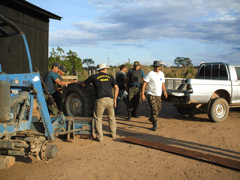
Federal environmental law enforcement agents disable a tractor by removing its tires. (Photo: Bobby Bascomb)
[GRUNT]
GELLERMAN: Removed the tires
[GRUNT]
GELLERMAN: And hauled them away.
[CLUNK OF TIRE IN TRUCK]
GELLERMAN: Exhausted and frustrated, the IBAMA agents say they’re not defeated. They say they’ll return another day to arrest the rancher.
BASCOMB: Last year, IBAMA agents confiscated 400 trucks and tractors in the Amazon from illegal loggers and ranchers. And they confiscated eight million cubic feet of wood. But we soon learn that enforcing environmental law in the Amazon can have unforeseen consequences.
[MILL SOUNDS]
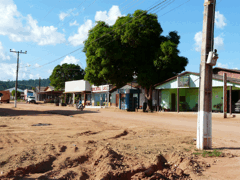
Many people in the town of Caracoal are out of work since IBAMA agents shut down the illegal lumber mill. (Photo: Bruce Gellerman)
BASCOMB: The next day, we got a flat tire in the remote town of Caracol. The owner of the vacant hotel and restaurant offers to sell us the entire town. Nine months earlier IBAMA agents busted Caracol’s lumber mill and the community has been out of work since.
GELLERMAN: At the abandoned mill, a young man carrying a baby steps over scraps of hardwood.
GELLERMAN: Can I as you a couple of questions?
[MAN SAYING “NO, NO”]
GELLERMAN: But the man doesn’t want to talk.
GELLERMAN: So nobody is working here…
GELLERMAN: He’s afraid.
GELLERMAN: So, what do people do here for a living?
MAN: [Translation] They fish little fish otherwise they will starve.
GELLERMAN: So what do you make of this place?
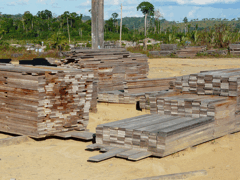
IBAMA agents recently closed down the lumber mill in the town of Caracoal, Para. (Photo: Bruce Gellerman)
LIMA: This is one of the several lumber mills that IBAMA and all the other government agencies – they stopped the environmental impact and started the social impact. They maybe have here at least 80 families with no income. Someone is paying the price, and the price that we see here for the preservation is poverty.
BASCOMB: Stepped up enforcement of environmental laws is part of the reason deforestation in the Amazon is down to the lowest level in two decades.
GELLERMAN: But Amazon cattle rancher John Carter says, there’s got to be a better way.
CARTER: The trick to conservation in the Amazon is to get greed and harness that greed. Make that force focus on keeping the forest standing.
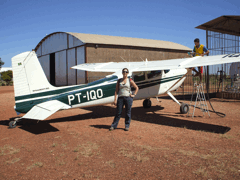
Producer Bobby Bascomb getting ready to take off in John Carter’s Cessna. (Photo: Bruce Gellerman)
GELLERMAN: John Carter is a horseback ridin’, tobacco chewin’, rootin ’tootin cowboy from San Antonio, Texas. 14 years ago, after serving as paratrooper in Iraq, Carter married a Brazilian woman and moved here.
[PLANE SOUNDS]
GELLERMAN: To a remote corner of the southeastern Amazon. These days Carter spends more time in his single engine Cessna than the saddle.
CARTER: I came down chasing a dream. It had nothing to do with making money or financial reasons - it was strictly to live a life of adventure and frontier.
GELLERMAN: John Carter’s wife comes from a wealthy, influential family. Her grandfather introduced the breed of cattle that’s raised in the Amazon.
[PLANE RADIO SOUNDS]
GELLERMAN: With backing from his father-in-law, Carter started a 12 thousand acre ranch along the Amazon frontier in the state of Mato Grosso.

The view of agricultural land in the State of Mato Grosso from John Carter’s plane. (Photo: Bobby Bascomb)
CARTER: That’s Agua Boa due west of us. That was a small teeny-weenie little town when I first moved here. This area had very small cattle numbers at that time. Today as a result of expanding landmass they’ve opened land, because of deforestation this is the largest cattle auction in the world. It’s in the Guinness book of records.
[AIRPLANE SOUNDS FADE; PARADE SOUNDS AND MUSIC]
BASCOMB: Marching bands commemorate the 30th anniversary of the city of Agua Boa. The boomtown lies in the geographic heart of Brazil at the center of cow country. The place is perfect for agriculture: flat as Kansas but four times as large. What was once a forested frontier is now on the cutting edge of Brazil’s future, and fertile territory for John Carter and his Allianca de Terra – the Land Alliance.
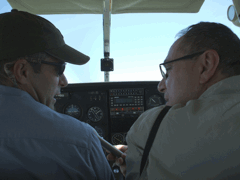
Living on Earth’s Bruce Gellerman interviews cattle rancher John Carter as he pilots his Cessna over Mato Grosso farmland. (Photo: Bobby Bascomb)
[DRIVING SOUNDS]
CARTER: Look over here, off to the east over here at around 11:00 all that's our forest reserve.
BASCOMB: Carter drives us around his ranch. In this part of the Amazon, you’re supposed to keep half your land forested, but few follow the law. When Carter bought the place he decided to let 22 hundred acres regrow. He says that choice cost him more than a million dollars in lost productivity.
CARTER: And I let it come back to forest to come into compliance with the forest code.
BASCOMB: Do you regret doing that?
CARTER: I don't regret it, no. Personally I don't, but it was not a very wise decision. I don't get paid anything. I should be getting paid carbon credits for that. Two to three tons a year per hectare that's sequestering – that's a pretty good revenue stream for the ranch.
BASCOMB: The experience made John Carter one of the biggest cheerleaders for a REDD mechanism in Brazil. He founded the Land Alliance, and after convincing ranchers he wasn’t a CIA agent, signed up 160 Amazon farmers proving they could do better financially by doing good environmentally.
CARTER: We want to create mechanisms that puts a carrot out in front of the producer instead of a gun barrel behind his head.
BASCOMB: Since cattle are the force driving deforestation in the Amazon the Land Alliance hopes to put consumers in the driver’s seat.
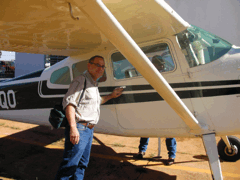
Living on Earth’s Bruce Gellerman boards John Carter’s Cessna. (Photo: Bobby Bascomb)
GELLERMAN: Carter’s Land Alliance is creating a premium brand of beef, guaranteed not to come from deforested land, for which consumers would pay a premium price. In effect, a REDD mechanism for red meat. His organization has devised a vigorous certification system for member farmers.
CARTER: So he’s coming into our system, he’s taking off his clothes basically, he’s showing us his body and all the defects, and he’s allowing us to tell him what he needs to do to come back into compliance.
GELLERMAN: So the idea is to make the value of a standing forest more valuable than if you were going to cut it down and use if for cattle, soy beans, and so on?
CARTER: Absolutely. Our goal, hands down, is to buy time. More importantly, is that long-term goal, like you said, to make the standing forest at least almost comparable valuable to the cleared forest. If it’s 30 percent as valuable as the cleared forest, we’re gonna have a tremendous impact. Doesn't have to be one to one. People sense that there’s a lot of goodwill and a lot of people that are willing to create a new model.
[BIRD SOUNDS]
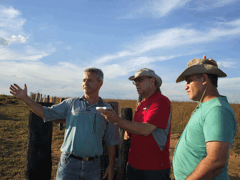
Living on Earth’s Bruce Gellerman interviews soy farmer Jamar Brunier (left) and Marco Lima translates (right). (Photo: Bobby Bascomb)
GELLERMAN: Jamar Brunier is one of those people. Recently, Brunier joined Carter’s Land Alliance. 20 years ago, he and his wife migrated from the south of Brazil to Mato Grosso. They came with one suitcase each and a shared dream. Today, they own a grainery and 65 hundred acres of land.
BRUNIER: [Translation] When I bought this land I didn’t have any information from anyone. I simply came with a Caterpillar and we cleared everything here. Come look down here.
[WALKING SOUNDS]
BRUNIER: [Translation] We simply cut, chopped down everything all the way to the riverbanks.
GELLERMAN: Land Alliance evaluators scrutinized satellite photos and visited Brunier’s farm. They found he had destroyed a thousand acres too much. They gave Brunier a report detailing what need to be done and the technical expertise to come into compliance. More carrot, less stick.
BRUNIER: [Translation] Now with the help of the alliance they came here and told us what to do and before the government comes here and fine me, I’m going to start to replant with the original woods from here. I will do the reforestry.
GELLERMAN: Would you have known that without the Land Alliance?
BRUNIER: [Translation] No, I was going to be fined by the government such a fine that I would never have money to pay. I was going to go bankrupt.
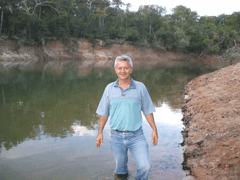
Farmer Jamar Brunier stands in a river that runs through his property. When colonists first settled the frontier the Brazilian government encouraged them to deforest all the river banks to reduce malaria. Now Land Alliance farmers like Jamar Brunier are reforesting riparian zones. (Photo: Bobby Bascomb)
[BIRD SOUNDS]
GELLERMAN: But these days it’s not the government that worries farmer Jamar Brunier the most – it’s a non-governmental organization: Greenpeace. The NGO’s scathing report “Slaughtering the Amazon” blames farmers like Brunier for destroying the forest.
BRUNIER: [Translation] If NGO’s come here to accuse us, what are they going to do? We’ve been doing things right. I will tell Greenpeace my water is clean.
GELLERMAN: What would you like to tell Greenpeace?
BRUNIER: [Translation] I really want to tell the guys from Greenpeace that they need to know from where the food come from – from where the butter comes from, where the food their kids eat comes from. And I cry because no one comes to hear us what we want to say. They only come here to spank us. That’s why I’m crying.
BRUNIER: [Translation] Our intentions are good.
GELLERMAN: Says Amazon farmer Jamar Brunier.
[MUSIC: Jose DaLouis Alenca was recorded on location in Para Brazil by the LOE producers.]
CURWOOD: This song about the Amazon forest was composed and sung by one of the Federal environmental agents who took Bruce and Bobby along on the raids of illegal ranches.
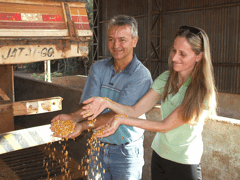
Jamar Brunier and his wife proudly display part of their harvest of corn. (Photo: Bobby Bascomb)
[ALENCA SINGING SONG IN PORTUGUESE]
CURWOOD: It’s really a beautiful song, but I don’t speak Portuguese. Bobby, Bruce – what does it say?
GELLERMAN: Well, it’s a really sad song, as you can hear. It’s about destruction of the Amazon forest, and the song is named after a town and bird in the forest.
BASCOMB: Right, that’s Jose Da Louis Alenca. He’s the federal agent who wrote this song, and he came by our hotel room after a long day with the SWAT team and brought his guitar along.
CURWOOD: So the song is about a town and the forest. It sounds a lot like the place you went to where you met the young man who hadn’t worked for some nine months after the Brazilian feds had shut down the town’s illegal log mill?
GELLERMAN: Yeah, they shut down the town. It really does bring into stark contrast when you’re talking about preserving the forest and mechanism like REDD, you also need to think about the millions of people – most of whom are poor, Steve – who live in the Amazon and how efforts to keep the forest standing are going to affect them.
CURWOOD: So for REDD to work it’s not just a matter of raising the money to pay for it, or monitoring the forest, but figuring out who gets this dough and what they do with it.
BASCOMB: Exactly, Steve. And as we found out REDD will also have to deal with the indigenous people who live in the Amazon and have been protecting it for thousands of years. They still control a huge part of the forest.
CURWOOD: Well, we’ll be listening.
Links
Living on Earth wants to hear from you!
Living on Earth
62 Calef Highway, Suite 212
Lee, NH 03861
Telephone: 617-287-4121
E-mail: comments@loe.org
Newsletter [Click here]
Donate to Living on Earth!
Living on Earth is an independent media program and relies entirely on contributions from listeners and institutions supporting public service. Please donate now to preserve an independent environmental voice.
NewsletterLiving on Earth offers a weekly delivery of the show's rundown to your mailbox. Sign up for our newsletter today!
 Sailors For The Sea: Be the change you want to sea.
Sailors For The Sea: Be the change you want to sea.
 The Grantham Foundation for the Protection of the Environment: Committed to protecting and improving the health of the global environment.
The Grantham Foundation for the Protection of the Environment: Committed to protecting and improving the health of the global environment.
 Contribute to Living on Earth and receive, as our gift to you, an archival print of one of Mark Seth Lender's extraordinary wildlife photographs. Follow the link to see Mark's current collection of photographs.
Contribute to Living on Earth and receive, as our gift to you, an archival print of one of Mark Seth Lender's extraordinary wildlife photographs. Follow the link to see Mark's current collection of photographs.
 Buy a signed copy of Mark Seth Lender's book Smeagull the Seagull & support Living on Earth
Buy a signed copy of Mark Seth Lender's book Smeagull the Seagull & support Living on Earth

